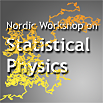Speaker
Udo Seifert
Description
Stochastic thermodynamics provides a framework for
describing small systems embedded in a heat bath and
externally driven to non-equilibrium. Examples are colloidal
particles in time-dependent optical traps, single
biomolecules manipulated by optical tweezers or AFM tips,
and motor proteins driven by ATP excess. A first-law like
energy balance allows to identify applied work and
dissipated heat on the level of a single stochastic
trajectory. Total entropy production includes not only this
heat but also changes in entropy associated with the state
of the small system. Within such a framework, exact results
like an integral fluctuation theorem for total entropy
production valid for any initial state, any time-dependent
driving and any length of trajectories can be proven [1].
These theoretical predictions have been illustrated and
tested with experiments on a colloidal particle pushed by a
periodically modulated laser towards a surface [2]. Key
elements of this framework like a stochastic entropy can
also be applied to athermal systems as experiments on an
optically driven defect center in diamond show [3,4]. For
mechanically driven non-equilibrium steady states, the
violation of the fluctuation-dissipation theorem can be
quantified as an additive term directly related to broken
detailed balance (rather than a multiplicative effective
temperature) [5,6]. Integrated over time, a generalized
Einstein relation appears which we have recently verified
experimentally [7]. Finally, optimal protocols are derived
which (i) minimize the work required to switch from one
equilibrium state to another in finite time [8] and (ii)
maximize the power of stochastic heat engines operating
between two heat baths [9].
[1] U. Seifert, Phys. Rev. Lett. 95: 040602/1-4, 2005.
[2] V. Blickle, T. Speck, L. Helden, U. Seifert, and C.
Bechinger,
Phys. Rev. Lett. 96: 070603/1-4, 2006.
[3] S. Schuler, T. Speck, C. Tietz, J. Wrachtrup, and U.
Seifert,
Phys. Rev. Lett. 94: 180602/1-4, 2005.
[4] C. Tietz, S. Schuler, T. Speck, U. Seifert, and J.
Wrachtrup,
Phys. Rev. Lett. 97: 050602/1-4, 2006.
[5] T. Speck and U. Seifert, Europhys. Lett. 74: 391-396, 2006.
[6] U. Seifert and T. Speck, EPL, in press, 2010.
[7] V. Blickle, T. Speck, C. Lutz, U. Seifert, and C. Bechinger.
Phys. Rev. Lett., 210601/1-4, 2007.
[8] T. Schmiedl and U. Seifert, Phys. Rev. Lett, 98:
108301/1-4, 2007.
[9] T. Schmiedl and U. Seifert, EPL 81, 20003, 2008.

